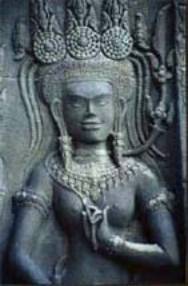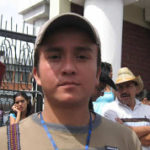Intro: Near Cambodia’s Angkor Wat an unexpected surprise from our hotel waitress offers a poignant reminder of the spoils of war and poverty.
Also see:
Gay Cambodia Stories
Gay Cambodia News & Reports 2004 to present
Gay Cambodia Photo Galleries
Richard Ammon
(837 words)
She first appeared from behind the old beverage cooler whose glass doors were often left indifferently open cooling off our corner of the restaurant and warming up the beer and colas. Short as most Khmer women, she was not quite as shy and obsequious as most of the other waitresses. She looked older and much more efficient, moving with purpose and poise. When she approached our table to take our order for dinner, her English was better than we expected.
Making a selection with her from the menu was more like being seated with mother and being told what was good for us, not necessarily what we wanted. She was disarmingly charming, polite and controlling as she pointed out her favorite dishes in place of our tentative choices. Our fish selection was usurped by her shrimp entree, a curried chicken was taken over by a chicken and vegetable plate with tomato sauce. "That is good choice, but this better. Oh, very good. You like it, you see."
 Such was our first encounter with Dy, our waitress at the Banteay Srei Hotel in Seim Reap, Cambodia. This quiet town, with the lazy and muddy Seim Reap River weaving down the middle, is adjacent to the vast Angkor temples and palaces left in silence nearly a thousand years ago by the dominant Khmer civilization. We had come half way around the globe to see for ourselves these stone monuments to a kingdom that had risen to great power and architectural wonder and then receded into the obscure jungle.
Such was our first encounter with Dy, our waitress at the Banteay Srei Hotel in Seim Reap, Cambodia. This quiet town, with the lazy and muddy Seim Reap River weaving down the middle, is adjacent to the vast Angkor temples and palaces left in silence nearly a thousand years ago by the dominant Khmer civilization. We had come half way around the globe to see for ourselves these stone monuments to a kingdom that had risen to great power and architectural wonder and then receded into the obscure jungle.
Until now, Cambodia had appeared in my awareness only as a footnote to Viet Nam and the war. Vague clips about the Khmer Rouge and Prince Sihanouk had been tucked obliquely into a corner of my mind. That was enough for most western laymen to know about this obscure little country on the Mekong delta. After all, our education, our language and our cultural heritage was rooted the other way, in Europe, and that was where we pointed our media. We knew far more about the British Royal’s household problems than we could ever say about a million corpses buried in the killing fields of a strange place called Kampuchea, now again called Cambodia.
I regret the neglect, especially now having walked on both the ancient and modern soil of this heartbroken culture and having felt the touch and warmth of one of the planet’s friendliest people. They have been truly abused but they are nevertheless still gentle and charming as Dy giving us our order for lunch.
After two days of temple climbing (and I do mean climbing–up stairs with 12" risers with only 6" treads; coming down required goat feet!) we sat down at our usual table for dinner, along with various cigarette smoke-enshrouded tour groups from Japan and France. Dy made her smiling approach to our table and listened to our brief revue of the day’s wonders. She had heard it a thousand times, but she laughed as we shared amazed impressions and our newly acquired Khmer words. She was delighted at our pronunciations. But dinner was ready and so, being well trained by now, we asked her what was good and soon she was off to the kitchen with her intentions for us.
Earlier that day we noticed she did not work the breakfast shift. Returning with our drinks, we asked her where she was that morning. "Oh, I have second job in town, I work there in morning," was her first reply. After she brought our entrees, I casually asked her what her other job was. "I am doctor."
We both looked up at her startled to make sure we had heard her correctly. "A doctor? Medical doctor?" She nodded with a big smile, "Yes, at emergency room in hospital here." Between courses we were told that she had a medical degree from the university in Phnom Penh and had done an internship in Paris. Now she lived here with her family and worked two jobs "because pay from first job not so much, only about $12 a month." My companion was a retired American physician and we looked at each other in disbelief. "I do small work at hospital, people sick, broken arm, sutures, sometimes babies." She liked the work but it just didn’t pay enough so she worked in the hotel restaurant where she could make extra money from the growing tourist trade.
Listening to her story, I felt that odd sensation when separate realities collide in paradox: a sense of excitement and dismay; of delight and discovery punctuated with shock and disbelief. Here was "Mrs. Doctor Dy Chantry" fussing over our meal with all the care and sincerity of a surgeon healing a wound. The incongruity struck us deeply. The injuries of this country suddenly felt all the more poignant because of the delight and easy warmth of this cheerful Cambodian physician serving sausages to tourists who could easily leave a month’s pay for a tip (which we did).
—————-
In Cambodia:
The infant mortality rate is 104 per 1,000 births.
The under five mortality rate is 163 per 1,000 births.
Only 30% of the population has access to safe water.
Only 19% of the population has access to adequate sanitation.
52% of children are moderately to severely underweight.
35% of children are not immunized for polio, measles or diphtheria.
(statistics provided by UNICEF)
















